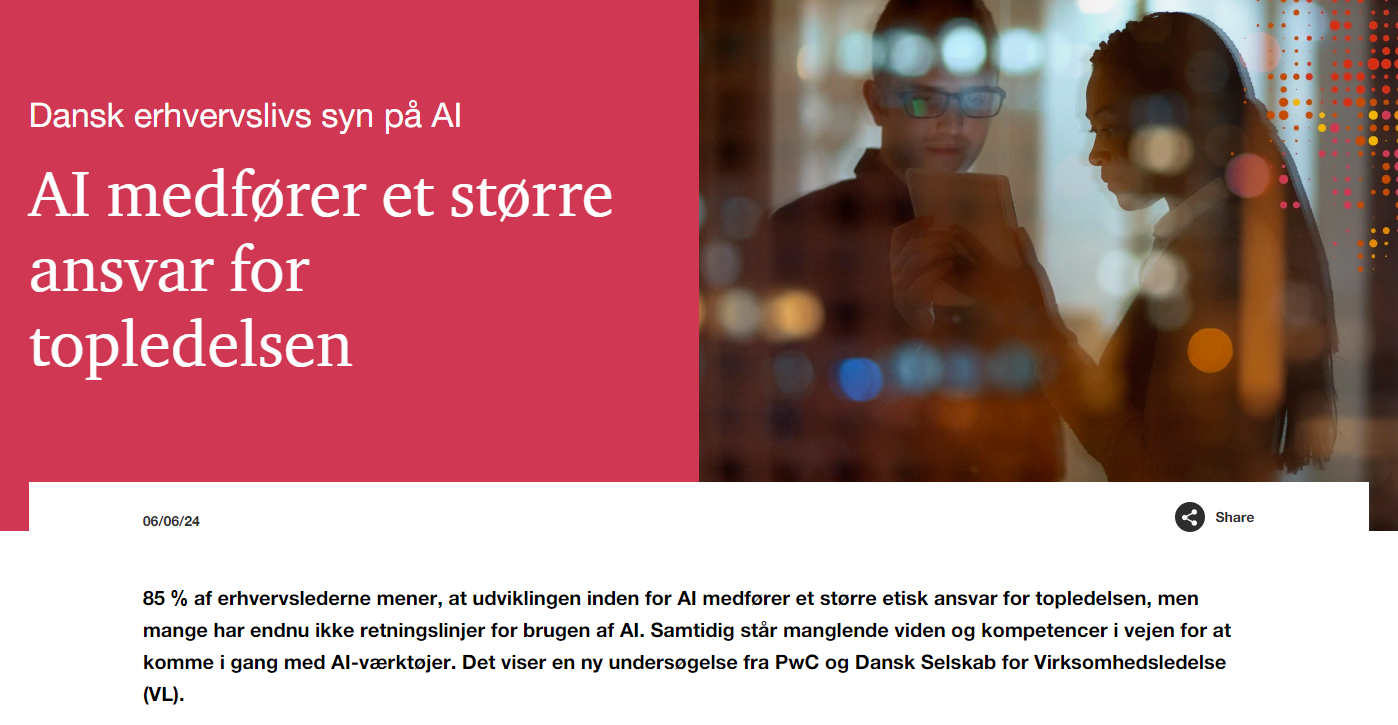
Does artificial intelligence
require more intelligent leadership?
Does artificial intelligence require more intelligent leadership?
Watch the videos and photos:
VL Summit 2024
PWC-study among VL-members:
AI means a greater ethical responsibility for the top management
Wise decision making and visionary leadership are, simply put, always the cornerstone of any successful business. But in a new digital era with artificial intelligence (AI), we are facing a revolution that challenges our traditional perception of leadership, gives us plenty of new opportunities and tests our strategic understanding of technology on a whole new level.
AI has taken society by storm, and it is now up to us as leaders to shape and lead this powerful technological development in a way that will define our businesses, the public sector, and other organizations for decades to come.
It is leadership that requires courage to decide when to be a “first mover” or a “fast follower”. Or “no follower” at all. It is leadership on new terms compared to what was possible yesterday and the day before.
It is leadership in a new age with AI as an innovative, intelligent tool, as a decision support tool, product developer, digital assistant, and practical helper in routine work, that we would like to explore in VL with the Annual Theme focus on AI.
There is a surplus of conferences, courses, and reports on artificial intelligence and how the new technologies will transform our society. Our focus in VL is leadership. How do we lead the new transformed reality and find the new potentials?
10 key principles for leading in an AI-driven era
Ten examples of a world where AI becomes an integral part of the leadership task. Where algorithm leadership is no longer for the chosen few, but a necessity for all:
1. Understand the potential of AI: AI can be used for more than improving and streamlining current processes. It is not enough to simply copy the old formulas and processes. Use AI to produce completely novel solutions.
2. Data-driven decision making: AI can be used to collect and analyse substantial amounts of data for better decision support. Businesses must invest in establishing proper data structure and management to ensure quality and availability of data for the AI systems.
3. Changing work processes: AI can automate many tasks and processes, which can lead to changes in how work tasks are performed. It may require restructuring of work processes, in some places a completely new company culture and redistribution of responsibilities.
4. Education and capacity building: AI requires AI expertise. It will require training and competence building in all types of organizations. And forget about only sending the IT department and a couple of super users to take a course. The expertise must be spread throughout the organization.
5. Ethics: Organizational changes must also include an ethical framework for the use of AI. It involves defining guidelines and policies for responsible and ethical use of the technology. As a leader, you have the responsibility to ensure that AI is used in a way that not only complies with laws and regulations but also in a morally and ethically sound way.
6. Innovation: AI can be used as a source of innovation. To explore new business models and completely new sales opportunities and products for which the technology provides the basis.
7. SMEs: Even small businesses can benefit from AI. Cloud-based services and AI platforms are more accessible than ever. But it still requires a strategic approach and targeted leadership. The small businesses that master AI can join the competition more quickly on an equal footing with the larger players.
8. Changing organizational culture: The implementation of AI can change the way the company makes decisions. It may require a change in organizational culture to promote data-driven decision-making and experimental approaches.
9. Strategic adaptation: The implementation of AI requires an updated or revised company strategy. This may include identifying new business opportunities, improving the competitive position, and revising goals and metrics.
10. The board must be onboard: It is no use that only the management of the company or organization throws itself into becoming AI-savvy. This should also include the boards of directors. AI is becoming a decisive strategic factor in all types of organizations, and the investment in and handling of the new technologies is an important matter for the board members.
The Inevitable Development
AI is no longer a futuristic fantasy. It is a reality that is already deeply embedded in many of our daily operations in all sectors of society. From customer interactions to data-driven decisions, AI has proven to be an invaluable partner in our search for competitive advantages, good customer and citizen experiences and the development of new products and services. But the new era requires a new approach to leadership.
In an AI-driven world, leadership is no longer limited to traditional hierarchies and top-down decisions. It requires an understanding of how to utilize technology to optimize processes and create value. It requires an understanding of the fact that algorithms and technologies not only work for us but together with us. Side by side with us. If we want to be in control, we have to understand what it is all about.
It is important to understand that the implementation of AI is not only a technical challenge, but also an organizational and cultural challenge. Successful AI implementation requires the business or organization to be able to adapt to the new opportunities and challenges that the technology brings. It requires leadership, commitment, strategic technological understanding, and a holistic approach to change throughout the organization.
It is all about embracing the technologies and using them as a tool to create added value and innovation. As leaders, we now have the opportunity to shape the future of our companies, develop our organizations to a new era with the same scale of potential as the industrialization. We have the opportunity to create a sustainable competitive advantage in businesses and to create a public sector suitable for the tasks of a modern welfare society. It requires courage, knowledge, and willingness as a leader to take the leap into the exciting world of AI.
By Lisbeth Knudsen, Board Chair, VL
VL INSIGHTS
Listen to AI-related podcast episodes of the VL Society’s own podcast.
Watch the videos and photos:
VL & AI
Annual Theme kickoff & General Assembly
REGIONAL CONFERENCES WERE A GREAT SUCCES!
The VL Society held three regional conferences in February and March based on this year’s theme “Does artificial intelligence require more intelligent leadership?” With CEO Ida Bratting Kongsted at the helm, VL has been on tour around the country with McKinsey & Company, who presented the main points from their recently issued report “The economic potential of GenAI in Denmark”.
Read the summary from the interesting events and watch one of the very current debates between VL members, which was about the maturity and implementation of AI in their own companies.
ADVISORY BOARD 2023/2024
VL has invited an Advisory Board consisting of top executives, experts and researchers within AI to be idea-generators and co-creators in the unfolding of VL’s Annual Theme and the VL Summit. VL always focus primarily on leadership and on business, and this year we seek different angles and perspectives on artificial intelligence. Thus, the members of the Advisory Board are specifically selected in relation to the industry or the field of expertise in which they operate. We are inspired by the Advisory Board and use their experiences to create headlines, find possible speakers and record podcasts leading up to the VL Summit on 6 June, 2024.
We are grateful to receive priceless advice and sparring from the following members of this year’s Advisory Board:
Anja Monrad, Board Professional, Keynote Speaker, Angel Investor, Ex-Dell Executive, Vice Chair of VL’s Board, VL64
Casper Klynge, SVP, Danish Chamber of Commerce, former tech-ambassador, VL4
Henriette Halberg Thygesen, EVP, Maersk, VL3
Le Gammeltoft, CCO, Netcompany
Lisbeth Knudsen, Board Chair for VL, VL1
Martin Brynskov, Director, DTU Connecting Communities Centre & Senior Researcher, PhD, DTU Compute
Mille Lindskrog Knudsen, Board Professional: Bestyrelseskvinder, DOT, Fiks IT, Viking Software, ETK EMS, etc., VL102
Pernille Halberg Salamon, Director of Hørsholm Municipality , Member of the National Digital Council, VL9
Rune Aagaard, Attorney, Partner, Mazanti-Andersen, representantive of the Steering Committee for the VL Summit 2024, VL102
Stine Mølgaard Sørensen, Partner, Alliance VC, Co-founder, Radiobotics






VL Forum app (IOS)
VL Forum app (Android)